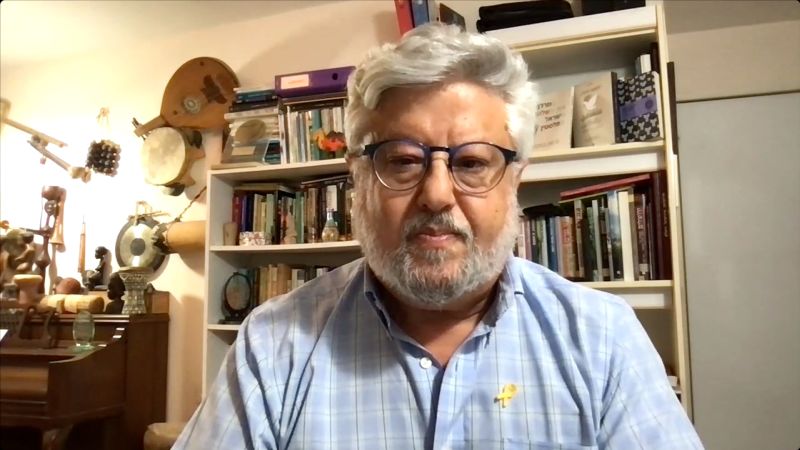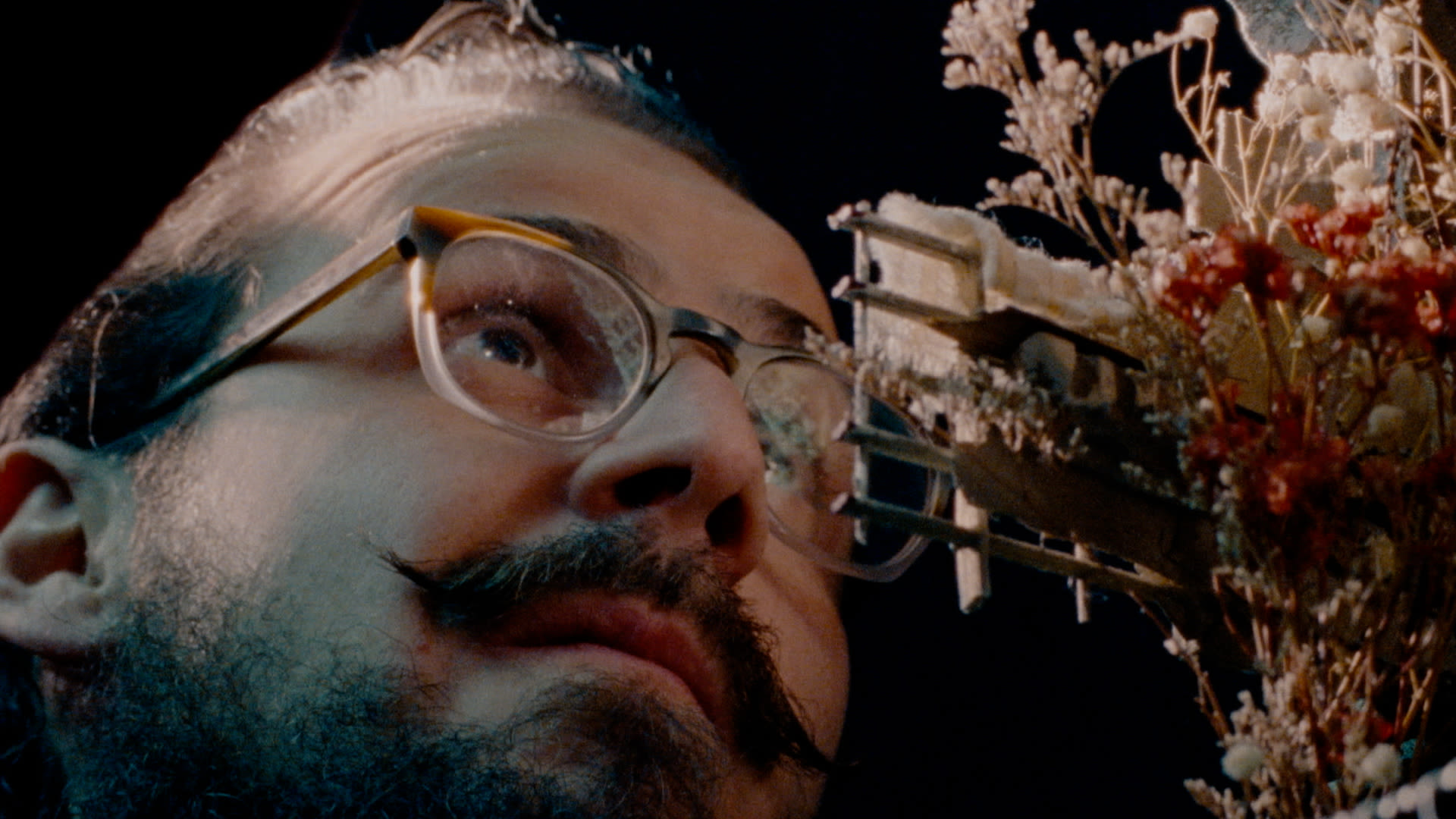This is where I source all my found objects,
my dried plants, my miniature furniture,
Christmas ornaments, shells, paints, snails, stones.
This knob here is a radio switch.
But what I see in it is an exploded engine.
This is my stash of miniature toys.
Sometimes the furniture I find is already broken
and the shop owner says,
Well, I can’t sell you that it’s broken.
What are you gonna do with it? [laughs]
This is from my previous marriage wedding cake.
That’s what’s left of the marriage.
Before the Syrian war,
my art was very therapeutic, was very cathartic.
[solemn music]
I was just making, making, making.
I wanted to build the Damascus of my memories.
[solemn music]
A lot of generations came here.
A lot of paint happened on these walls.
[solemn music]
So it’s exactly what I’m gonna do.
Paint, scrape, paint, scrape.
[solemn music]
Before you know it,
the architecture was telling the story of the human
that lived within.
[solemn music]
And that would bring me home.
[solemn music]
[Mohamad speaking foreign language]
[Mom foreign language]
[Mohamad speaking foreign language]
[Father foreign language]
[Mama speaking foreign language]
[Father speaking foreign language]
[Mama speaking foreign language]
[Father speaking foreign language]
[Mama speaking foreign language]
[Father and Mohamad speaking foreign language]
[Mama and Mohamad speaking foreign language]
Bye, take care.
I always wanted to come to the United States
to study architecture here.
After 9/11 happened, there was a travel ban in place.
Now it wasn’t called the travel ban.
My visa was stamped as single entry only.
And I realized that I was stuck here
and I was extremely homesick.
I was giving up being with my parents,
being with my older brother, my sisters.
I missed my sister’s wedding and the birth of her children.
I was very close to my grandmother
and I couldn’t go to her funeral.
It felt horrible.
I would say to my parents, Okay,
this is, that I’m coming home.
They’d say No, don’t do this.
Don’t jeopardize your career.
[solemn music]
It was one of those nights.
It might’ve been Thanksgiving break.
Nothing’s open. Where is everybody?
They’re at home.
Mm.
They’re with their families.
And I was in this open architecture studio space and I was
the only person in there.
I remember I was so frustrated and I had a photograph
of an old [speaking foreign language]
facade that was on a candy wrapper.
And I think a little bulb turned on in my head
and it told me, Well, stop whining.
If you can’t get home, why don’t you make home?
[solemn music]
And I would collect all the wood scraps
that my peers would throw in the floor,
the plastics, the styrene.
[solemn music]
That’s when really kind of clicked like, okay, this is me.
This is where I’m from.
[explosion echoes]
[people screaming]
[objects clatter]
It’s hard to pin down when exactly the war started.
My parents hesitated to leave home.
It’s not until the clashes broke off a hundred meters away
and shook our whole house.
They realize, okay,
the conflict is now on our doorstep and we need to leave.
They came and lived in my small apartment.
I was a very young designer pitching 200, 300,
$400 million buildings.
I had to keep a straight face at work and still perform.
But I was very troubled.
Extremely troubled.
[solemn music]
I had a monitor literally on news channels 10 hours a day.
I’m working and I’m seeing the Arab world blow up.
[explosion crashes]
I lost my appetite.
I didn’t do any art for maybe two years straight.
And I’ve internalized it, internalized it.
[Mohamad speaking foreign language]
I took to my models like an explosion.
[solemn music]
If something did not look right
I took a hammer to it and I broke it.
And I snapped it, I would throw ash on it and burn it.
[explosions crash]
People were so sick of seeing blood and bodies
as a way to build empathy.
And I get that. I was sick too.
How many dead bodies can be seen?
You just go like, oh my gosh,
not another Syrian came washing off the shores.
Swipe away to the next story.
[solemn music]
There was this fire inside me to start humanizing refugees
and to tell their stories.
[solemn music]
[Man speaking foreign language]
[Mohamad speaking foreign language]
[Man speaking foreign language]
[Mohamad speaking foreign language]
[Man speaking foreign language]
[Mohamad speaking foreign language]
[Man speaking foreign language]
[Mohamad speaking foreign language]
[Man speaking foreign language]
[clothes flapping]
I was interviewing a refugee
one time and the man started crying and he said,
I’m very grateful for their help.
But the night we arrived here,
the lady welcoming us was teaching me
how to turn a light switched on.
Could you please translate to her that I had a very
beautiful house in Syria with a lot of appliances
and a lot of things in it.
And I really know how to switch a light on.
We come from established lives.
We had a life.
You can’t explain millions people
with one stab refugee foster.
[solemn music]
Marathi is a Welsh word
without a direct translation into English.
It describes a state of extreme homesickness to a homeland
that is no longer existed or has never, ever existed.
I have certainly fallen in love with the idea
of Damascus in Syria.
I only had a moment there.
When I opened my eyes, I was swept away.
[speaking foreign language]
The Syrian war resulted in a lot of marriages failing.
My mom moved back to Damascus
because she became extremely homesick.
She was saying in Arabic [speaking foreign language]
whatever happens to everybody will happen to me as well.
I can’t go to Syria because I will get drafted
to the military.
Going and seeing my mom in Lebanon is the closest
I can be to home.
My nice [speaking foreign language].
I love my lemon.
The news was not showing what we are losing culturally.
Undoubtedly, the most expensive price being paid
in conflicts is the human life.
No question.
But also there’s something to weep over
when you see a thousand year old Minaret be bombed
out of existence.
[solemn music]
You wipe a nation’s history, you wipe their architecture.
Two generations later it’s as though they’ve never existed.
[solemn music]
What does a civilization leave behind
when they lived there for thousands of years?
How many layers do they leave of paint and stories?
[solemn music]
I was painting a picture so that people can fully understand
the magnitude of destruction.
[solemn music]
For a split second,
you are transported to a different place.
[solemn music]
[Mohamad speaks in foreign language]
[Mama] Mm.
[Mohamad speaks in foreign language]
[Mama speaks in foreign language]
[Mama and Mohamad speaking in foreign language]
[Mama speaking in foreign language]
[Mohamad speaking in foreign language]
[Mama] Okay.
[Mohamad speaking in foreign language]
[Mama speaking in foreign language]
[Mohamad speaking in foreign language]
[Mama speaking in foreign language]
[Mohamad speaking in foreign language]
[Mama speaking in foreign language]
[Mohamad speaking in foreign language]
[Mama speaking in foreign language]
[Mohamad speaking in foreign language]
[Mama speaking in foreign language]
[Mohamad speaking in foreign language]
[Mama speaking in foreign language]
[solemn piano music]
Wars tend to change people.
They change some of us.
The memories that I have could very well not exist today.
[solemn piano music]
The grace and warmth
could very well have vanished.
[solemn piano music]
We don’t have a full family portrait
that is newer than 1999.
[solemn piano music]
The four siblings of us and the two bairns have not been
under a single roof in 14, 15 years.
I stopped counting.
And I miss it. I miss home.
[solemn piano music]
I miss home.
[solemn piano music]
[solemn music]







More News
Here are the courtroom sketch artists drawing Trump’s hush money trial
Katy Perry’s own mom fell for her Met Gala AI photo. Do you know what to look for?
Other Admissions in Kristi Noem’s Book